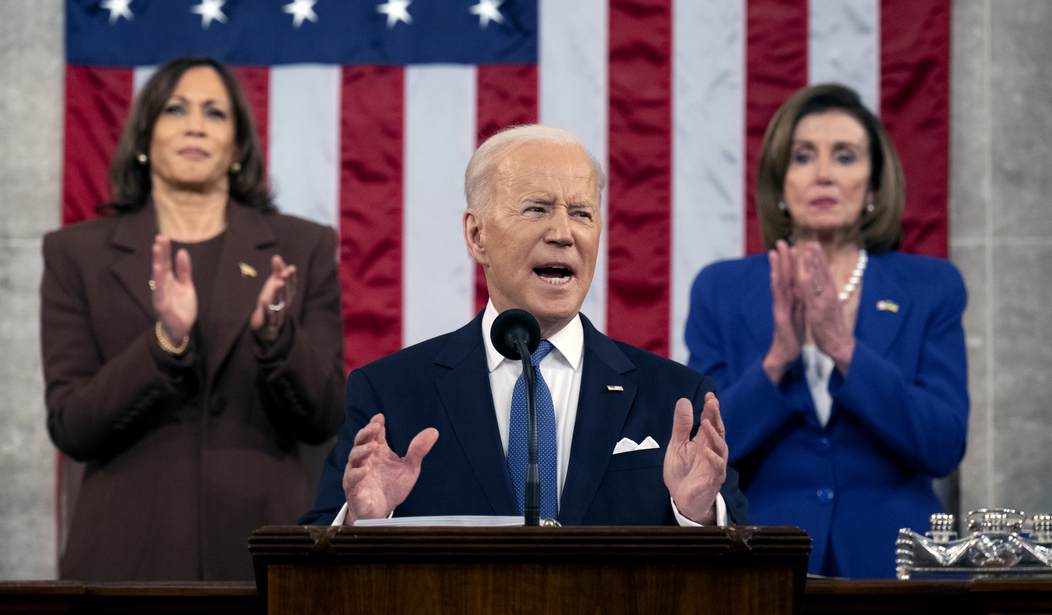Is this a true State of the Union bounce, a rally effect in the Ukraine crisis — or a statistical burp? Joe Biden got an eight-point increase in overall support in the latest NPR/PBS poll conducted by Marist after Biden’s State of the Union address. He made gains on several issues, but none more dramatic than on the conflict between Ukraine and Russia:
Following a State of the Union address which underscored President Joe Biden’s commitment to promoting democracy across the world, the president enjoys a bounce in his handling of the crisis in Ukraine. His standing among the American people has also improved on the issues of the economy and the coronavirus pandemic. While Biden’s bounce is predominantly among his Democratic base, he also enjoys moderate gains among independents. Of note, rare, bipartisan consensus exists on the issue of sanctions levied against Russia. Most Americans, regardless of party, support these sanctions, and nearly seven in ten favor them even if it means higher energy prices domestically.
There is some reason to suspect that this result is somewhat unreliable, but let’s take a look at its face value first. Biden hasn’t bounced all the way back, but he appeared to make up considerable ground. The prior NPR/PBS series had Biden’s overall approval at 40/55; today’s poll puts him within the margin of error at 47/50. That would be his best job approval rating since a mid-January Fox News poll put him at 47/52.
The Ukraine crisis appears to be driving most of that change, even though — again — the numbers aren’t great. It also doesn’t appear to be lifting Biden’s image as a world leader, at least not yet:
A majority of Americans (52%) approve of how President Biden is handling the situation in Ukraine, up from 34% last week. 44% disapprove, down from 50% last time. Only 4% are unsure, down from 16%. A plurality of Americans (46%) says Biden’s approach to the conflict in Ukraine is on the mark. 43% say he is being too cautious, and only 6% think he is being too aggressive. …
45% of Americans think Biden’s decisions as president have strengthened the United States’ position on the world stage while a majority (51%) say he has weakened it.
However, Biden’s rating also rose on other issues. Approval on pandemic management went up to 55% (+8) and his rating on the economy rose eight points to 45% too. However, 53% of respondents still disapprove of Biden’s performance on the economy, so it’s still a mixed bag — as well as being only one poll so far showing a bounce.
NPR thinks it might be a rally effect more than a SOTU bounce:
Biden appears to be benefiting from a rally-around-the-Ukrainian-flag moment. A whopping 83% of respondents said they support the economic sanctions the U.S. and allies have leveled against Russia. That includes eight-in-10 Republicans.
More than two-thirds (69%) said they would still support the sanctions even if they result in higher energy prices. That includes four-in-five Democrats, three-quarters of independents and almost six-in-10 of Republicans.
It’s worth noting too that the polling sample is D+6 (33/27/38), within reason if still a bit friendly to Biden. That may matter when it comes to overall job approval, the bounce of which may have entirely come from rallying Biden’s base. Democrats’ job approval rating for Biden is 90/9, while Republicans is almost the exact opposite at 10/89. The most telling demo here is among independents, which rated Biden’s job performance at 39/58 — a very wide gap that somehow disappears in the overall number of 47/51 among RVs.
It’s quite unusual to see such a wide gap among independents not be reflected in the overall number. That seems especially curious when (a) the two parties almost entirely cancel each other out, and (b) independents make up a significantly larger plurality than either party (38%). It’s very clear that Biden’s bounce isn’t coming among the unaffiliated:
- Economy: 38/58
- Pandemic: 49/50
- Ukraine crisis: 48/50
- World leadership: 40/56
From these numbers, it appears that Marist used some sort of calculation that discounted independents while boosting the impact of Democrats. Pollsters use modeling algorithms in every survey to attempt to properly form a predictive model based on the data, of course. However, this appears way off the mark — especially in a political environment as hostile to Biden and Democrats over the past several months. If we gauge Biden’s standing from the independents, there doesn’t appear to have been much bounce at all. If there’s a rally effect here, it might just reflect an NPR/PBS/Marist rally.
We’ll see what subsequent polling series tell us. For now, this one looks outlier-ish, and potentially an artifact of wishful thinking.







Join the conversation as a VIP Member